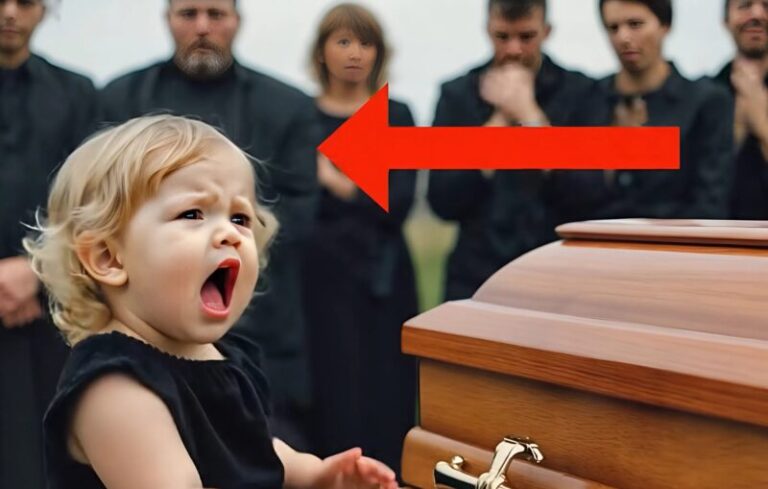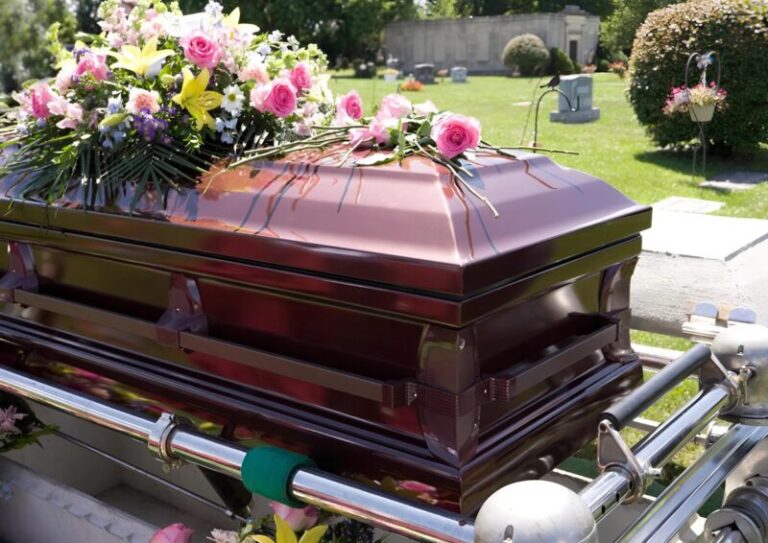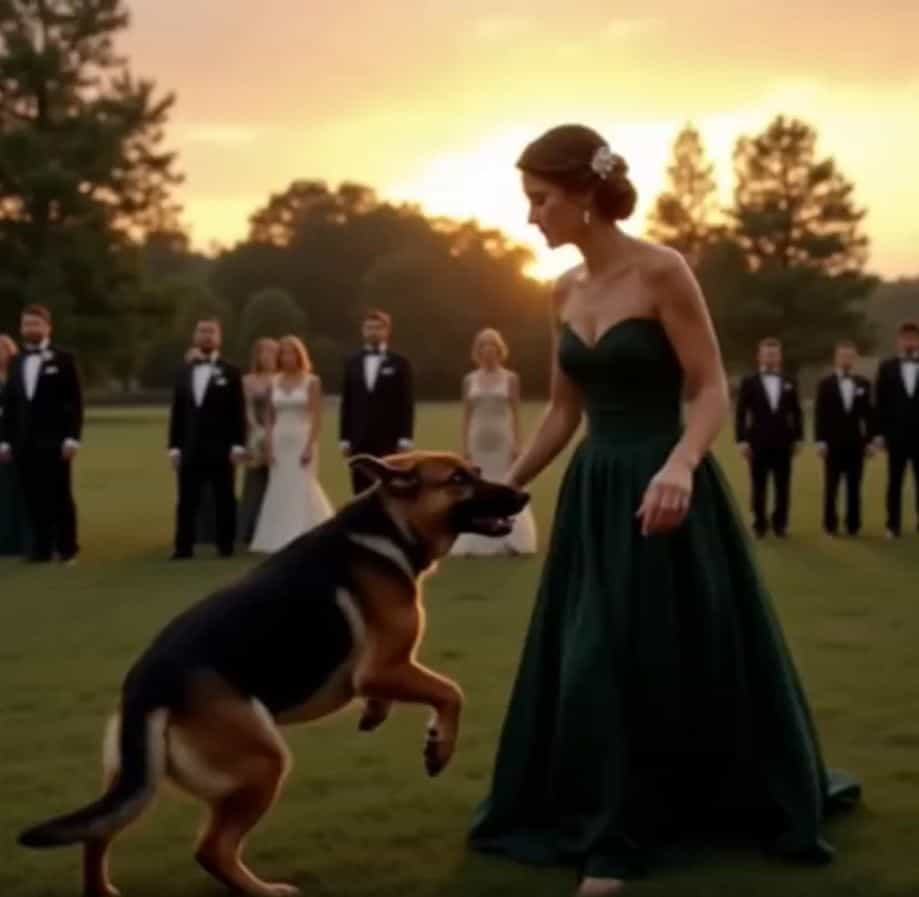The little girl’s words hung in the air
The little girl’s words hung in the air, a grotesque echo in the hallowed silence of the funeral hall. “He’s scared! Daddy told me: ‘I’m here, help me!’ He’s inside! He didn’t leave!”

A collective gasp rippled through the mourners, followed by a confused murmur. The priest, a man accustomed to solemnity, looked visibly shaken. The widow, Sarah, who had been a statue of grief, now swayed, her eyes wide with a terrifying mix of hope and dread.
“Lily, darling,” Sarah whispered, her voice a raw rasp, “What are you saying?” She knelt, trying to embrace her daughter, but the child remained fixated on the coffin.
“He’s cold, Mama,” Lily whimpered, her tiny finger still pointing. “But he’s here. He wants to come out.”
Most guests dismissed it as a child’s vivid imagination, a coping mechanism for an incomprehensible loss. A few, however, felt a prickle of unease. Old Mrs. Gable, known for her superstitions, clutched her rosary beads tighter. Dr. Elias Thorne, a family friend and the attending physician who had pronounced David dead, frowned, a flicker of professional doubt crossing his face. He had signed the death certificate, citing massive internal trauma from the car accident. It was an open-and-shut case. Or so he thought.
Then, a low, almost imperceptible sound broke the silence. A faint, rhythmic thump… thump… thump. It was so soft, so muffled, that at first, everyone dismissed it as the thudding of their own hearts, or perhaps the creak of the old wooden floorboards. But then it came again, clearer this time, from the very center of the room. From the coffin.
A collective shiver ran through the assembly. Sarah’s eyes darted to the coffin, then back to Lily, whose small face was now contorted in a silent plea. “He’s knocking, Mama!” she cried, her voice rising to a frantic pitch. “He wants to get out!”
Panic erupted. A few people screamed. Others rushed forward, their faces pale with a mixture of terror and morbid curiosity. The undertaker, a portly man named Mr. Abernathy, who had been overseeing the proceedings with practiced solemnity, stumbled back, his face ashen.
“Impossible!” Dr. Thorne declared, pushing through the crowd. “It’s impossible! David is… he’s gone. It must be the settling of the wood, or… or the air pressure.” Yet, even as he spoke, his eyes were fixed on the polished lid of the coffin, where a faint, almost invisible mist seemed to be forming on the inside. Condensation.
“Open it!” someone shouted from the back.
“We can’t!” Mr. Abernathy stammered, his voice trembling. “It’s… it’s sealed. For the viewing, yes, but for burial…”
“Open it now!” Sarah shrieked, her grief-stricken composure finally shattering into raw, primal fear. She lunged towards the coffin, her hands scrabbling at the latches.
Dr. Thorne, despite his professional skepticism, felt a cold dread creep up his spine. He had seen the fog. He had heard the faint thumping. And the child… Lily had always been an unusually perceptive child. He joined Sarah, his medical instincts overriding his scientific certainty. Together, with the help of a few brave relatives, they managed to pry open the heavy lid.
The sight that greeted them was horrifying.

David lay there, not as a peaceful corpse, but as a man struggling for air. His eyes, though still closed, were fluttering beneath the lids. His lips were slightly parted, a faint, rasping breath escaping them. His chest, beneath the crisp white shroud, rose and fell almost imperceptibly. His skin, though cool, was not the deathly pallor they had seen just hours before; there was a faint, almost imperceptible flush to it. And his hands, folded neatly on his chest, were clenched into fists, the knuckles white.
He was alive.
A wave of screams, gasps, and shouts tore through the funeral hall. Chaos erupted. People stumbled back, some fainting, others rushing forward in a desperate attempt to help. Sarah collapsed onto David’s chest, sobbing hysterically, not with grief, but with an overwhelming, terrifying relief.
“He’s breathing!” Dr. Thorne yelled, his voice hoarse with shock. He immediately began checking David’s pulse, his fingers trembling. It was weak, thready, but undeniably there. “Call an ambulance! Now!”
Within minutes, the solemn funeral hall was transformed into a scene of frantic urgency. Paramedics, their faces grim with disbelief, rushed in, their equipment clattering. They carefully lifted David from the coffin, his body stiff but undeniably responsive to their touch. Lily, still clinging to her mother’s hand, watched with wide, tear-filled eyes as her father was wheeled out on a stretcher, an oxygen mask covering his face.
At the hospital, the medical team was baffled. David, a man pronounced dead just hours earlier, was in a deep, unresponsive coma. His vital signs were incredibly weak, but stable. There were no signs of brain death, no irreversible damage that would explain his previous state. It was as if he had been in a profound, death-like trance – a state unknown to modern medicine.
“Catatonia?” one doctor suggested, but quickly dismissed it. “Not like this. Not with these readings.”
“It’s a miracle,” Sarah whispered, her voice raspy from crying, her eyes never leaving David’s still form. She held Lily close, the child now quiet, occasionally reaching out a small hand towards her father.
Over the next few days, David remained in the coma. Doctors ran every test imaginable, but found no definitive answers. The “tragic accident” that had supposedly claimed his life – a head-on collision with a truck – had left him with severe but not fatal injuries. The initial diagnosis of death had been a grave error, a medical anomaly that no one could explain.
Lily, however, seemed to understand. She would sit by her father’s bedside, humming soft tunes, occasionally whispering to him. “Daddy, the birds are singing. Do you hear them?” Or, “Daddy, Mama misses you. Wake up soon.”
One afternoon, as Dr. Thorne was reviewing David’s charts, Lily tugged on his lab coat. “Doctor,” she said, her voice surprisingly clear for a two-year-old, “Daddy is dreaming of the big dark place. He says it’s cold.”
Dr. Thorne, initially dismissive of the child’s ramblings, paused. He looked at David’s chart. The initial report had mentioned hypothermia, but it had been attributed to the time spent at the accident scene. Could David have been conscious, or semi-conscious, experiencing the cold of the morgue, the coffin?
Later, Lily pointed to David’s arm. “He says his arm hurts. The bad man made it hurt.”
Sarah’s blood ran cold. “Bad man?” she repeated, her eyes darting to Dr. Thorne. The accident had been ruled a single-vehicle incident, David’s car swerving into the truck. But what if it wasn’t? What if someone had been involved?
Dr. Thorne, now fully convinced of Lily’s uncanny connection to her father, began to re-examine the accident report with a fine-tooth comb. He found a small, overlooked detail: a faint, almost invisible dent on the passenger side door of David’s car, inconsistent with the angle of impact from the truck. And a witness statement, initially dismissed as unreliable, about a dark sedan speeding away from the scene just before the collision.
The police were brought back into the investigation. With Lily’s fragmented, dream-like clues, and Dr. Thorne’s renewed scrutiny, they began to piece together a disturbing picture. It wasn’t an accident. David had been forced off the road. Someone had deliberately caused the collision, perhaps hoping to silence him.
The motive, they discovered, lay in David’s work as an investigative journalist. He had been close to exposing a major corruption scandal involving a powerful local politician. The “accident” was a hit, orchestrated to look like a tragic mishap.
As the investigation unfolded, David slowly, miraculously, began to emerge from his coma. His first conscious sound was a weak groan. His first conscious movement, a slight twitch of his fingers. And his first words, whispered hoarsely to Sarah, were, “Lily… she saved me.”
The recovery was long and arduous. David had to relearn to walk, to speak clearly, to process the trauma of being buried alive. But he was alive. And he remembered. He remembered the dark sedan, the face of the driver, the sudden swerve, and the crushing impact. He remembered the cold, the darkness, and the terrifying realization that he was trapped, unable to move, unable to scream, listening to the muffled sounds of his own funeral. He remembered Lily’s voice, a beacon in the terrifying void, pulling him back.
The politician and his accomplices were eventually arrested, thanks to David’s testimony and Lily’s inexplicable ability to perceive what others could not. The story of David’s miraculous survival and Lily’s extraordinary gift spread like wildfire, a tale of horror and hope that defied all logic.
Life for Sarah, David, and Lily was forever changed. David carried the scars, both physical and psychological, of his ordeal. Sarah lived with the constant fear of what might have been, and the profound gratitude for what was. And Lily, their little miracle, continued to see and hear things others couldn’t. Her gift, once a source of terror, became a quiet, guiding presence in their lives, a reminder of the thin veil between worlds, and the enduring power of a child’s love. They learned to live with the extraordinary, forever bound by the horrifying secret of the unfinished farewell, and the chilling truth that had brought David back from the brink of the grave.

A collective gasp rippled through the mourners, followed by a confused murmur. The priest, a man accustomed to solemnity, looked visibly shaken. The widow, Sarah, who had been a statue of grief, now swayed, her eyes wide with a terrifying mix of hope and dread.
“Lily, darling,” Sarah whispered, her voice a raw rasp, “What are you saying?” She knelt, trying to embrace her daughter, but the child remained fixated on the coffin.
“He’s cold, Mama,” Lily whimpered, her tiny finger still pointing. “But he’s here. He wants to come out.”
Most guests dismissed it as a child’s vivid imagination, a coping mechanism for an incomprehensible loss. A few, however, felt a prickle of unease. Old Mrs. Gable, known for her superstitions, clutched her rosary beads tighter. Dr. Elias Thorne, a family friend and the attending physician who had pronounced David dead, frowned, a flicker of professional doubt crossing his face. He had signed the death certificate, citing massive internal trauma from the car accident. It was an open-and-shut case. Or so he thought.
Then, a low, almost imperceptible sound broke the silence. A faint, rhythmic thump… thump… thump. It was so soft, so muffled, that at first, everyone dismissed it as the thudding of their own hearts, or perhaps the creak of the old wooden floorboards. But then it came again, clearer this time, from the very center of the room. From the coffin.
A collective shiver ran through the assembly. Sarah’s eyes darted to the coffin, then back to Lily, whose small face was now contorted in a silent plea. “He’s knocking, Mama!” she cried, her voice rising to a frantic pitch. “He wants to get out!”
Panic erupted. A few people screamed. Others rushed forward, their faces pale with a mixture of terror and morbid curiosity. The undertaker, a portly man named Mr. Abernathy, who had been overseeing the proceedings with practiced solemnity, stumbled back, his face ashen.
“Impossible!” Dr. Thorne declared, pushing through the crowd. “It’s impossible! David is… he’s gone. It must be the settling of the wood, or… or the air pressure.” Yet, even as he spoke, his eyes were fixed on the polished lid of the coffin, where a faint, almost invisible mist seemed to be forming on the inside. Condensation.
“Open it!” someone shouted from the back.
“We can’t!” Mr. Abernathy stammered, his voice trembling. “It’s… it’s sealed. For the viewing, yes, but for burial…”
“Open it now!” Sarah shrieked, her grief-stricken composure finally shattering into raw, primal fear. She lunged towards the coffin, her hands scrabbling at the latches.
Dr. Thorne, despite his professional skepticism, felt a cold dread creep up his spine. He had seen the fog. He had heard the faint thumping. And the child… Lily had always been an unusually perceptive child. He joined Sarah, his medical instincts overriding his scientific certainty. Together, with the help of a few brave relatives, they managed to pry open the heavy lid.
The sight that greeted them was horrifying.

David lay there, not as a peaceful corpse, but as a man struggling for air. His eyes, though still closed, were fluttering beneath the lids. His lips were slightly parted, a faint, rasping breath escaping them. His chest, beneath the crisp white shroud, rose and fell almost imperceptibly. His skin, though cool, was not the deathly pallor they had seen just hours before; there was a faint, almost imperceptible flush to it. And his hands, folded neatly on his chest, were clenched into fists, the knuckles white.
He was alive.
A wave of screams, gasps, and shouts tore through the funeral hall. Chaos erupted. People stumbled back, some fainting, others rushing forward in a desperate attempt to help. Sarah collapsed onto David’s chest, sobbing hysterically, not with grief, but with an overwhelming, terrifying relief.
“He’s breathing!” Dr. Thorne yelled, his voice hoarse with shock. He immediately began checking David’s pulse, his fingers trembling. It was weak, thready, but undeniably there. “Call an ambulance! Now!”
Within minutes, the solemn funeral hall was transformed into a scene of frantic urgency. Paramedics, their faces grim with disbelief, rushed in, their equipment clattering. They carefully lifted David from the coffin, his body stiff but undeniably responsive to their touch. Lily, still clinging to her mother’s hand, watched with wide, tear-filled eyes as her father was wheeled out on a stretcher, an oxygen mask covering his face.
At the hospital, the medical team was baffled. David, a man pronounced dead just hours earlier, was in a deep, unresponsive coma. His vital signs were incredibly weak, but stable. There were no signs of brain death, no irreversible damage that would explain his previous state. It was as if he had been in a profound, death-like trance – a state unknown to modern medicine.
“Catatonia?” one doctor suggested, but quickly dismissed it. “Not like this. Not with these readings.”
“It’s a miracle,” Sarah whispered, her voice raspy from crying, her eyes never leaving David’s still form. She held Lily close, the child now quiet, occasionally reaching out a small hand towards her father.
Over the next few days, David remained in the coma. Doctors ran every test imaginable, but found no definitive answers. The “tragic accident” that had supposedly claimed his life – a head-on collision with a truck – had left him with severe but not fatal injuries. The initial diagnosis of death had been a grave error, a medical anomaly that no one could explain.
Lily, however, seemed to understand. She would sit by her father’s bedside, humming soft tunes, occasionally whispering to him. “Daddy, the birds are singing. Do you hear them?” Or, “Daddy, Mama misses you. Wake up soon.”
One afternoon, as Dr. Thorne was reviewing David’s charts, Lily tugged on his lab coat. “Doctor,” she said, her voice surprisingly clear for a two-year-old, “Daddy is dreaming of the big dark place. He says it’s cold.”
Dr. Thorne, initially dismissive of the child’s ramblings, paused. He looked at David’s chart. The initial report had mentioned hypothermia, but it had been attributed to the time spent at the accident scene. Could David have been conscious, or semi-conscious, experiencing the cold of the morgue, the coffin?
Later, Lily pointed to David’s arm. “He says his arm hurts. The bad man made it hurt.”
Sarah’s blood ran cold. “Bad man?” she repeated, her eyes darting to Dr. Thorne. The accident had been ruled a single-vehicle incident, David’s car swerving into the truck. But what if it wasn’t? What if someone had been involved?
Dr. Thorne, now fully convinced of Lily’s uncanny connection to her father, began to re-examine the accident report with a fine-tooth comb. He found a small, overlooked detail: a faint, almost invisible dent on the passenger side door of David’s car, inconsistent with the angle of impact from the truck. And a witness statement, initially dismissed as unreliable, about a dark sedan speeding away from the scene just before the collision.
The police were brought back into the investigation. With Lily’s fragmented, dream-like clues, and Dr. Thorne’s renewed scrutiny, they began to piece together a disturbing picture. It wasn’t an accident. David had been forced off the road. Someone had deliberately caused the collision, perhaps hoping to silence him.
The motive, they discovered, lay in David’s work as an investigative journalist. He had been close to exposing a major corruption scandal involving a powerful local politician. The “accident” was a hit, orchestrated to look like a tragic mishap.
As the investigation unfolded, David slowly, miraculously, began to emerge from his coma. His first conscious sound was a weak groan. His first conscious movement, a slight twitch of his fingers. And his first words, whispered hoarsely to Sarah, were, “Lily… she saved me.”
The recovery was long and arduous. David had to relearn to walk, to speak clearly, to process the trauma of being buried alive. But he was alive. And he remembered. He remembered the dark sedan, the face of the driver, the sudden swerve, and the crushing impact. He remembered the cold, the darkness, and the terrifying realization that he was trapped, unable to move, unable to scream, listening to the muffled sounds of his own funeral. He remembered Lily’s voice, a beacon in the terrifying void, pulling him back.
The politician and his accomplices were eventually arrested, thanks to David’s testimony and Lily’s inexplicable ability to perceive what others could not. The story of David’s miraculous survival and Lily’s extraordinary gift spread like wildfire, a tale of horror and hope that defied all logic.
Life for Sarah, David, and Lily was forever changed. David carried the scars, both physical and psychological, of his ordeal. Sarah lived with the constant fear of what might have been, and the profound gratitude for what was. And Lily, their little miracle, continued to see and hear things others couldn’t. Her gift, once a source of terror, became a quiet, guiding presence in their lives, a reminder of the thin veil between worlds, and the enduring power of a child’s love. They learned to live with the extraordinary, forever bound by the horrifying secret of the unfinished farewell, and the chilling truth that had brought David back from the brink of the grave.
RELATED NEWS...
 Top Video Viral
Top Video Viral

